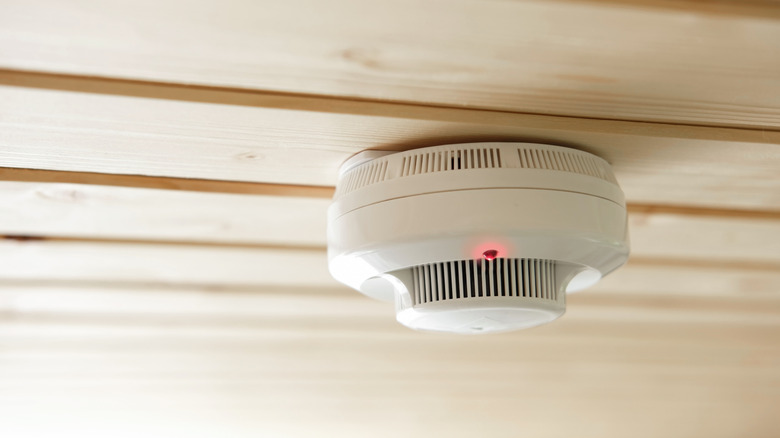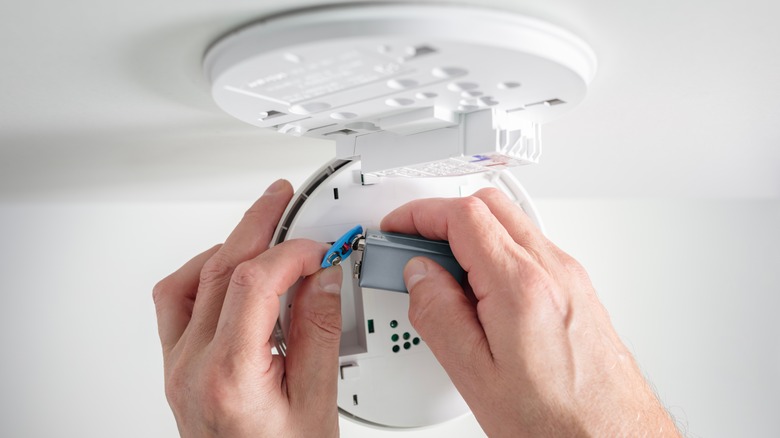Reasons Why Your Smoke Alarm Might Randomly Go Off
We may receive a commission on purchases made from links.
Smoke alarms are an important safety feature that every home must be equipped with. According to the National Fire Protection Association, 59% of the fire-related deaths between 2018 to 2022 had no fire detectors on the premises. Having these devices throughout your entire home significantly decreases your chances of injuries and death. However, sometimes you may hear a sound go off on your detector when there is no fire. This isn't necessarily cause for concern, though — there are some harmless reasons why your smoke alarm might randomly go off.
Whether your smoke detector chirps or blares, the sound can be quite deafening and annoying. It can also rattle you, especially if you don't see a fire in your home. Before you go out and buy a new detector, it is important to take the right steps to test your smoke alarm. But what if you've already checked it, yet it keeps making noises? Your fire detector can go off for many reasons due to its placement, outside elements, and even issues with the device itself.
High humidity or remodeling projects can trigger your smoke alarm
While it's important to consider how many smoke detectors you need, where you place them in your home matters as well. Areas with high humidity and steam (like kitchens and bathrooms) can trigger your smoke alarm to falsely alert you. In some cases, these devices can't tell the difference between smoke and moisture in the air. The best way to ensure your smoke detector doesn't go off is to ventilate the room by either having fans on, opening your windows, or turning off humidifiers.
Your home remodeling project can also randomly set off your smoke alarm. Dust and chemical odors from paints and refinishing products can trigger the detector. You can alleviate this issue by airing out the room, as well as cleaning your detector after you finish for the day. While you may be tempted to remove the batteries or the device, please keep it on and secured to ensure you and anyone else working is safe.
Outdoor elements can set off the alarm
Outdoor elements, like outside smoke, dirt and debris, and bugs can make your fire alarm go off. Smoke from nearby grills and fire pits can travel into your home through fireplaces, screen doors, and open windows. If you are not using a grill or fire pit and smoke from outside is entering your home, you should still follow all fire and smoke safety precautions, like closing all windows and doors and leave your home if you feel unsafe. Smoke from outside can also travel through your fireplace, so it is also important to inspect your chimney at least once a year to ensure the air in your house remains clean.
Outdoor smoke isn't the only thing that can travel into your home and set off your smoke detector; even bugs can go into small crevices on your device, causing it to go off randomly. You can easily solve this issue by cleaning your smoke alarm. To stop it from happening again, spray around the area with pest control spray, and dust frequently with a vacuum attachment. Remember to handle the device very carefully. Rough handling and chemicals from pest control spray can damage your appliance, causing it to malfunction.
Further detector device issues
Just like any other appliance, your smoke detector can have some issues over time. In many cases, most alarms will have a chirping sound for non-emergency problems like a low battery, or the end of its lifespan. Your device will alert you of a low battery mostly through constant low chirps. By replacing your batteries twice a year around the start and end of daylight saving time, you'll stop those low battery warning chirps from happening.
You've checked the batteries, and it keeps going off. That may mean it is at the end of its life. Smoke detectors last about 10 years from their manufacture date. When you purchase an existing home, you should always check the back of the installed alarm for this date. If you notice that it has expired, you need to update the detector. As you search for a new alarm, consider an upgrade like a smart smoke detector that connects to your phone like the Google Nest Protect, First Alert Smoke and Carbon Monoxide Alarm, or X-Sense Smart Smoke Detector.



